May 17, 2025 | 07:36 GMT +7
May 17, 2025 | 07:36 GMT +7
Hotline: 0913.378.918
May 17, 2025 | 07:36 GMT +7
Hotline: 0913.378.918
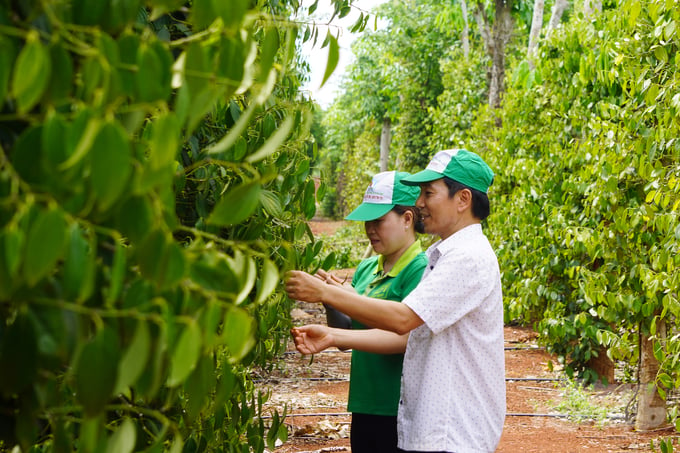
Bau May pepper has established a strong position in the pepper market thanks to persistent cultivation following organic standards. Photo: Nguyen Thuy.
Established in 2015 with an initial 12 members, the Bau May Agriculture - Commerce - Tourism Cooperative (Hoa Hiep Commune, Xuyen Moc District, Ba Ria – Vung Tau Province) now connects 1,000 members across various provinces to develop agriculture, focusing on the cultivation of Bau May pepper.
This pepper variety was developed by Lam Ngoc Nham, the director of the Bau May Agriculture - Commerce - Tourism Cooperative, who has spent over 20 years experimenting, researching, and selecting it.
"Bau May pepper has much stronger roots than other varieties, roots form wherever the stem is cut, the mature plants distribute buds evenly, resist drought, and are highly disease-resistant, yielding a high and stable productivity of 10 to 12 tons per hectare annually," Lam Ngoc Nham said. He also mentioned that the Bau May pepper variety has been registered for trademark protection at the Intellectual Property Office (Ministry of Science and Technology).
Recognizing that Ba Ria-Vung Tau has favourable climate and soil conditions for pepper cultivation, but seeing that farmers often planted and then cut down their pepper plants, each following their own farming methods, and especially noticing the impact of chemical pesticides and herbicides on the soil, water, and environment, Lam Ngoc Nham established the cooperative with an organic farming process aimed at achieving both Vietnamese and international organic certifications. This was his way of persuading the local farmers to adopt these practices.
"The 'traditional' organic farming method is essentially based on what our ancestors did before the widespread use of chemical fertilizers and pesticides. It’s nothing unfamiliar," Lam Ngoc Nham said with a smile.
According to Mr Nham, organic farming must "say no" to chemical fertilizers and pesticides, combining this approach with scientific and technical advancements to enhance crop productivity and efficiency. This includes investing in drip irrigation systems, drip fertilization systems, and composting garden by-products.
Mr Nham mentioned that when the cooperative was first established, convincing farmers to switch to organic farming from traditional methods was indeed challenging.
During the transition to organic farming, productivity did not initially reach previous levels. As a result, many people gave up. To persuade farmers to adopt organic agriculture, Nham had to provide evidence showing that the soil became more fertile under organic farming and that their health and the health of their families improved without the use of chemicals in production.
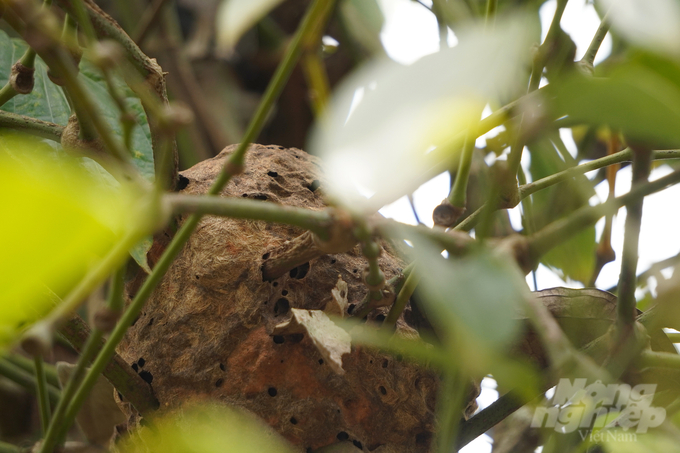
Ant nests act as "guard posts" to protect against pests in the organic pepper gardens of the Bau May Agricultural - Trade - Tourism Cooperative. Photo: Nguyen Thuy.
"Many people live in their gardens but use chemical pesticides and fertilizers. Initially, they might not notice the effects, but over time, their family's health is impacted. After explaining this, many farmers changed and gradually switched to organic farming. The farmers in the cooperative have now become proficient in organic farming methods, ensuring the quality of pepper supplied to the market", Mr Nham said.
To achieve high crop yields, Mr Lam Ngoc Nham researched and used homemade organic fertilizers made from egg embryos combined with milk and crab to nourish the pepper plants. In the pepper garden, he set up "guard posts" on the trees for beneficial natural predators to reside, helping to balance the ecosystem and control pests.
With over 30 years of experience in agriculture, Mr Lam Van Tam (a member of the Bau May Agricultural - Trade - Service Cooperative) chose pepper as his main crop and started transitioning to organic farming six years ago on his 3-hectare plot.
Tam noted that in previous years, the high cost of organic fertilizers made it difficult for farmers to invest. "Necessity is the mother of invention," he said, as cooperative members like him began making their own fertilizers by composting goat manure and fish waste for plant nutrition and using fallen leaves as mulch instead of burning them. As a result, his garden achieved good yields, and the harvested pepper was purchased by the cooperative.
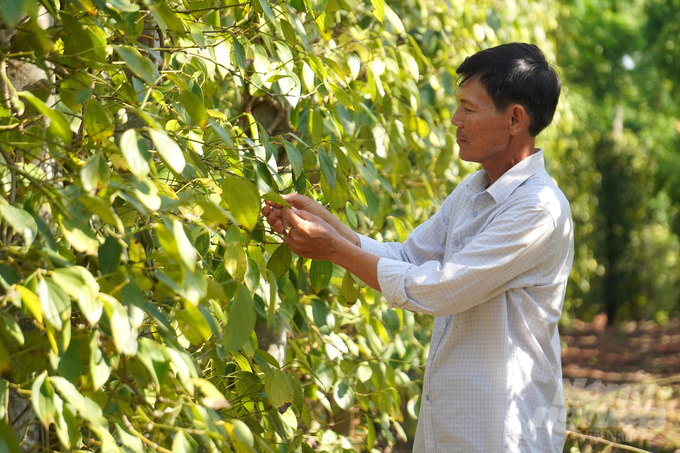
Mr Lam Van Tam (a member of the Bau May Agricultural - Trade - Service Cooperative) checks for pests on pepper plants. Photo: Nguyen Thuy.
During a tour of the farm, Mr Nham explained that solely planting pepper can lead to underutilization of the land. On average, 1 hectare yields about 5 tons of pepper, and with good care, it can reach 8-12 tons. However, by intercropping pepper with yam (Dioscorea), an additional 30-60 tons of yam per ha can be harvested, significantly increasing farmers' income. Therefore, the cooperative has been practising organic pepper intercropping with yam for many years, creating clean, sustainable agricultural products that ensure food safety and provide high profits for farmers.
According to Nham, intercropping helps create a vegetative cover that serves as a habitat for beneficial microorganisms, prevents erosion, and controls weeds. It also helps retain moisture and generate groundwater as yam tubers form at depths of 60 cm to 1.2 meters. This is considered the best solution to ensure sustainable pepper plant growth.
By adhering to organic farming standards from the beginning, Bau May Agricultural - Trade - Tourism Cooperative achieved the GlobalGAP (Global Good Agricultural Practice) certification for its pepper production area in 2017 and ISO 22000:2018 for food safety management systems in 2018.
"100% of Bau May pepper meets both Vietnamese and international organic standards, including USDA, EU, and JAS. Additionally, to ensure authenticity for consumers domestically and abroad, we have established a traceability management system, exclusive Bau May branding, and received FDA certification from the US Food and Drug Administration," Nham said.
To bring Bau May pepper to the market, Mr Lam Ngoc Nham also founded the Bau May Agriculture - Trade - Tourism Joint Stock Company and invested in machinery and processing technology, including self-invented sun-drying greenhouses for pepper post-harvest, which maximizes the nutritional value of the finished product.
Mr Nham has developed various product lines to enhance the value of Bau May organic pepper and organic yam, including seedless pepper, milk pepper, sun-dried pepper, salted fresh pepper, and yam vermicelli. Notably, Bau May seedless pepper sells for VND 15 million/kg, salted green pepper for VND 900,000/kg, milk pepper for VND 2.2 million/kg, sun-dried pepper for VND 2 million/kg, and salted fresh pepper for VND 950,000/kg.
Currently, Bau May's organic pepper products are exported to Japan, South Korea, Dubai, and the US, and efforts are ongoing to expand exports to Russia and China.

Bau May Agricultural - Trade - Service Cooperative's organic pepper and yam products. Photo: Nguyen Thuy.
Translated by Hoang Duy
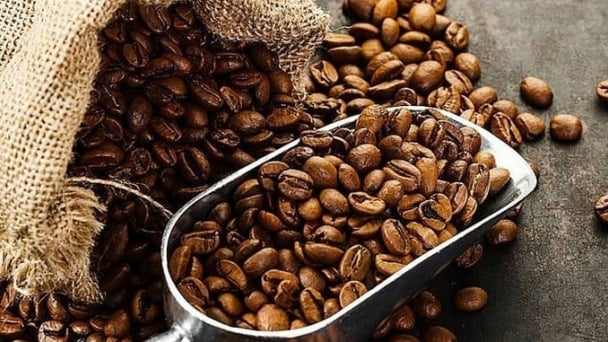
(VAN) Coffee prices on May 15, 2025, fell sharply by VND 2,500, trading at VND 125,700 – 126,200/kg. Global coffee prices also dropped significantly by 3%.
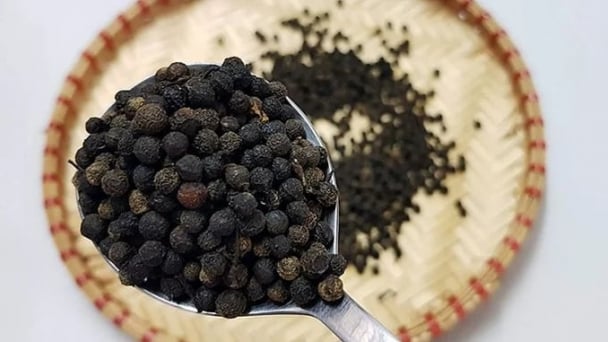
(VAN) Pepper prices on May 15, 2025, remain unchanged domestically, trading at VND 151,000 – 152,000/kg. Meanwhile, global pepper prices show mixed movements.
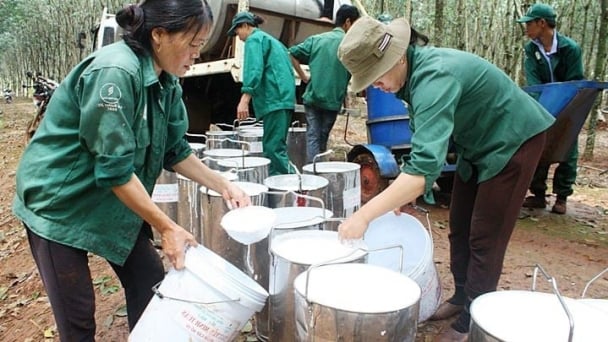
(VAN) Rubber prices on May 15, 2025, rise across global markets. Meanwhile, domestic latex prices remain steady, ranging from VND 397 to VND 462/TSC.
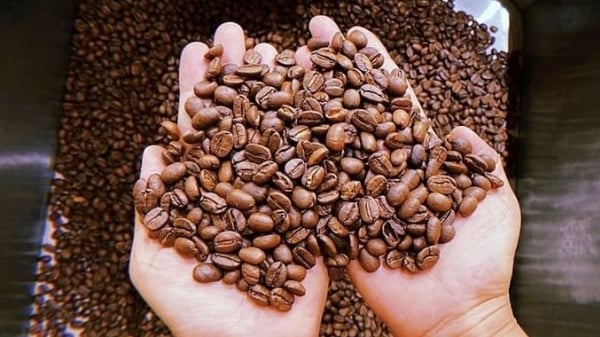
(VAN) Coffee prices on May 13, 2025 decreased by VND 1,200, trading around VND 125,500 – 126,000/kg. Global coffee prices also fell sharply.
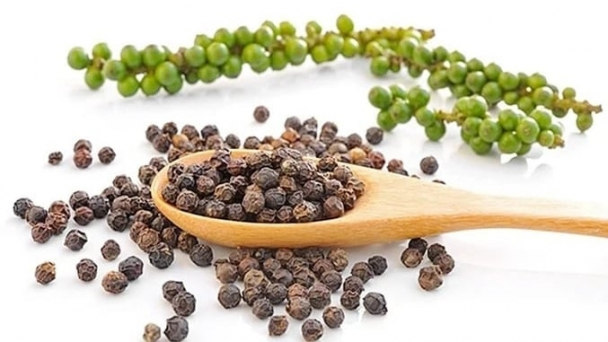
(VAN) Pepper prices on May 12, 2025 in the domestic market are hovering around VND 151,000 - 152,000/kg, while global pepper prices also remain flat.
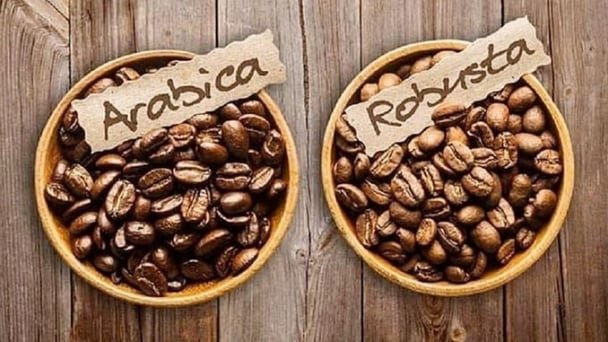
(VAN) Coffee prices on May 12, 2025, continue to trade around the range of VND 128,000 – 128,200/kg. Meanwhile, global coffee prices remain stable.

(VAN) Rubber prices on May 12, 2025, increase slightly globally. Latex purchasing prices in Vietnam remained steady, ranging from VND 397 to VND 462/TSC.